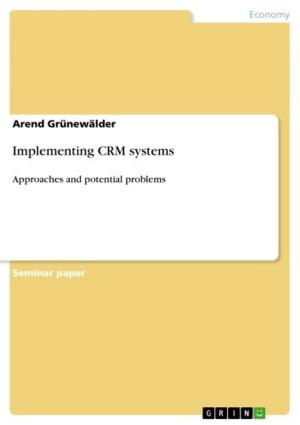Activity-Based costing and its later development into activity based budgeting and management
Business & Finance, Accounting| Author: | David Wagener | ISBN: | 9783640142361 |
| Publisher: | GRIN Publishing | Publication: | August 21, 2008 |
| Imprint: | GRIN Publishing | Language: | English |
| Author: | David Wagener |
| ISBN: | 9783640142361 |
| Publisher: | GRIN Publishing |
| Publication: | August 21, 2008 |
| Imprint: | GRIN Publishing |
| Language: | English |
Seminar paper from the year 2008 in the subject Business economics - Accounting and Taxes, grade: 1.3, University of the West of England, Bristol (Bristol Business School (University of the West of England)), course: Internes Rechnungswesen/ Management Accounting, 15 entries in the bibliography, language: English, abstract: Every accounting student of the past sixty years has learned about inventory costing- a bookkeeping procedure that manufacturing accountants follow to separate the production expense of an accounting period from the cost of manufactured product inventories at the end of the period. (Johnson and Kaplan, 1991, p. 130) This technique of valuing inventory should, although often practiced, not be used for managerial decision making though. It oversimplifies the consumption of overhead costs by products, services and customers and therefore leads to distorted cost information. Activity-based costing (ABC), developed by single manufacturing firms in the early 1980s, seems to provide more reliable information. The second part of this work describes the concept of ABC by summarizing the arguments of two pioneers in this field. In their book 'Relevance Lost: The Rise and Fall of Management Accounting', first published in 1987, H. Thomas Johnson and Robert S. Kaplan (1991) examine the traditions of management accountting and describe possible improvements. In part three the developments of ABC in the last 20 years are described by reviewing a choice of important literature. Part four then shows the impact that ABC had on implementing companies. The conclusion, part five, contains an assessment of the used literature and an evaluation of whether the critic of traditional management accounting has been overcome by ABC.
Seminar paper from the year 2008 in the subject Business economics - Accounting and Taxes, grade: 1.3, University of the West of England, Bristol (Bristol Business School (University of the West of England)), course: Internes Rechnungswesen/ Management Accounting, 15 entries in the bibliography, language: English, abstract: Every accounting student of the past sixty years has learned about inventory costing- a bookkeeping procedure that manufacturing accountants follow to separate the production expense of an accounting period from the cost of manufactured product inventories at the end of the period. (Johnson and Kaplan, 1991, p. 130) This technique of valuing inventory should, although often practiced, not be used for managerial decision making though. It oversimplifies the consumption of overhead costs by products, services and customers and therefore leads to distorted cost information. Activity-based costing (ABC), developed by single manufacturing firms in the early 1980s, seems to provide more reliable information. The second part of this work describes the concept of ABC by summarizing the arguments of two pioneers in this field. In their book 'Relevance Lost: The Rise and Fall of Management Accounting', first published in 1987, H. Thomas Johnson and Robert S. Kaplan (1991) examine the traditions of management accountting and describe possible improvements. In part three the developments of ABC in the last 20 years are described by reviewing a choice of important literature. Part four then shows the impact that ABC had on implementing companies. The conclusion, part five, contains an assessment of the used literature and an evaluation of whether the critic of traditional management accounting has been overcome by ABC.















